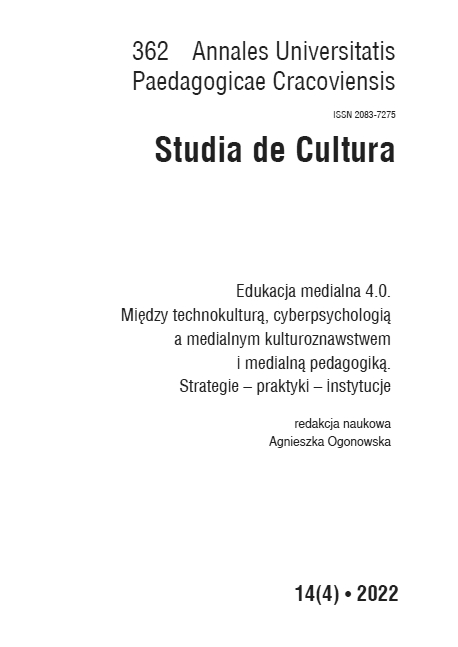Abstract
The article addresses the potential for musical development through contemporary audiovisual social media. It also takes into account the state of music education in schools. The author of the article asks whether applications in which concise video forms circulate (e.g., the TikTok application) can contribute to the musical development of young people. For this purpose, the author provides specific examples of musical practices that take place in these spaces. As the main point of reference, he examines the relationship between institutionally conducted music education and pop culture, which is at the center of the content circulating in contemporary media.
References
Białkowski Andrzej, Grusiewicz Mirosław, Michalak Marcin. 2010. Problemy i wyzwania edukacji muzycznej w Polsce. W: Edukacja muzyczna w Polsce. Diagnozy, debaty, aspiracje. Andrzej Białkowski, Mirosław Grusiewicz, Marcin Michalak (red.). Warszawa.
View in Google Scholar
Grusiewicz Mirosław. 2021. „Wartości muzyki współczesnej w kontekście treści szkolnej edukacji”. Lubelski Rocznik Pedagogiczny 30. 2. 167–179.
View in Google Scholar
Jabłońska Barbara. 2014. Socjologia muzyki. Warszawa.
View in Google Scholar
Jenkins Henry. 2007. Kultura konwergencji. Zderzenie starych i nowych mediów. Mirosław Filiciak, Bernardowicz Małgorzata (przeł.). Warszawa.
View in Google Scholar
Juda Łukasz. 2022. „Lapidarne formy wideo jako nowy obszar oddolnych praktyk muzycznych”. Kultura Współczesna 119. 3. 200–213.
View in Google Scholar
Klug Daniel. 2020. „It took me almost 30 minutes to practice this”. Performance and Production Practices in Dance Challenge Videos on TikTok. NCA 106th Annual Convention: Communication at the Crossroad. https://www.researchgate.net/publication/342852115_It_took_me_almost_30_minutes_to_practice_this_Performance_and_Production_Practices_in_Dance_Challenge_Videos_on_TikTok [dostęp: 20.05.2022].
View in Google Scholar
Labiak Daniel. 2015. Edukacja muzyczna a zainteresowania muzyczne młodzieży (w opiniach gimnazjalistów). W: Muzyka w dialogu z edukacją. Wybrane konteksty aktywności i edukacji muzycznej. Ewa Kochanowska, Rafał Majsner (red.). Kraków.
View in Google Scholar
Majorek Marta. 2015 Kod YouTube. Od kultury partycypacji do kultury kreatywności. Kraków.
View in Google Scholar
Marone Vittorio, Rodriguez Ruben. 2019. „‘What’s So Awesome with YouTube’: Learning Music with Social Media Celebrities”. Online Journal of Communication and Media Technologies 9(4). 1–15.
View in Google Scholar
Michalak Marcin. 2014. „U źródeł sporu o wartości edukacyjne muzyki popularnej”. Colloquium 6. 1. 89–112.
View in Google Scholar
Nowak Jakub. 2017. Polityki sieciowej popkultury. Lublin.
View in Google Scholar
Regiewicz Adam. 2020. Zasada tranzytywności w edukacji humanistycznej. Popkultura i kanon. W: Dyskusje wokół kultury popularnej jako edukacyjnej przestrzeni. Monika Adamska-Staroń (red.). Częstochowa.
View in Google Scholar
Rijal Saepul, Skumayadi Yudi. 2020. „The Use of the TikTok Application as a Music Learning Media for Junior High School Students”. Advances in Social Science, Education and Humanities Research 519. 104–108.
View in Google Scholar
Shusterman Richard. 2007. O sztuce i życiu. Od poetyki hip-hopu do filozofii somatycznej. Wojciech Małecki (przeł.). Wrocław.
View in Google Scholar
Stunża Grzegorz. D. 2018. Wyzwania kultury i edukacji uczestnictwa. Pokolenie Z i pokolenie Alfa. Gdańsk.
View in Google Scholar
SWPS, GetHero. 2021. Kim są polscy użytkownicy TikToka. Raport.
View in Google Scholar
Szubertowska Elżbieta. 2012. „Wczoraj i dziś edukacji muzycznej w kontekście jej funkcji wychowawczych”. Muzyka, Historia, Teoria Edukacja 2. 114–132.
View in Google Scholar
Weiner Agnieszka. 2013. „Współczesne (mega)trendy edukacji muzycznej a sytuacja polskiego nauczyciela”. Chowanna 41(2). 61–80.
View in Google Scholar

This work is licensed under a Creative Commons Attribution-NonCommercial 4.0 International License.
Copyright (c) 2023 Annales Universitatis Paedagogicae Cracoviensis. Studia de Cultura

